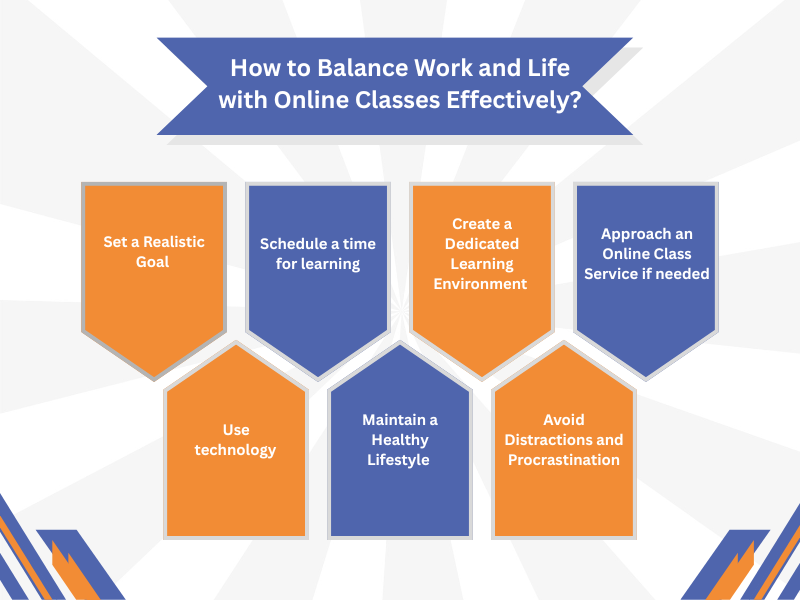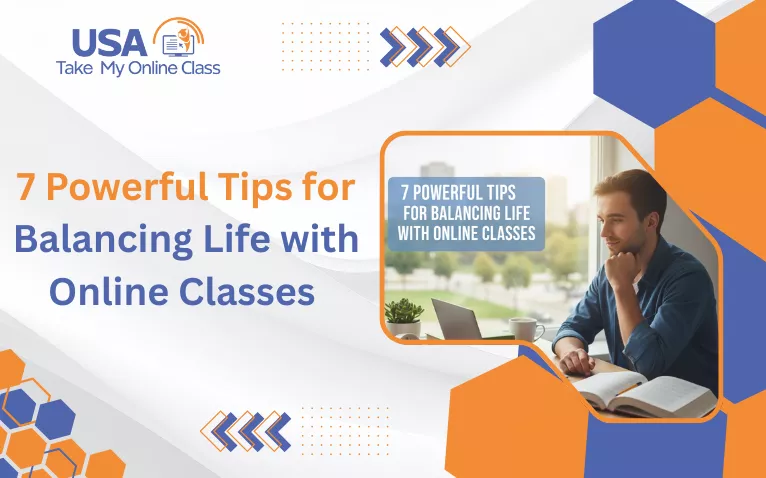Approximately 75% of undergraduate students are taking online courses. This highlights that a larger number of students are shifting to virtual learning. Hence, balancing life with virtual classes has become a vital skill. Managing virtual learning with everyday commitments and a busy schedule can be overwhelming. Unfortunately, learners struggle to handle their studies or maintain a healthy social life.
For students who find their commitments simply insurmountable and are struggling to maintain academic progress, the option to hire professional help is a vital consideration. When burnout is imminent, many wisely choose to ask, Can I pay someone to take my online class for me? to ensure they meet deadlines and maintain a high GPA without sacrificing their well-being
In this blog, we will provide 7 tips on how you can balance work and online education. Remember, balancing life with online classes isn’t about perfection; it’s about finding a sustainable rhythm that supports academic success and your well-being.
Table of Contents
ToggleHow to Balance Work and Life with Online Classes Effectively?

Managing stress during online classes while balancing classes and work is essential for your well-being. Stricking a balance between work and classs can help you improve your time management skills. Our online class time management tips will help you pursue your goals without sacrificing personal and professional commitments.
Set a Realistic Goal
Setting realistic and achievable goals is vital to maintaining a healthy work-life balance for students. If you’re struggling with work responsibilities and online learning, it’s easy to feel overwhelmed. Staying organized and breaking larger tasks into smaller manageable tasks will provide a sense of achievement and make your study less stressful.
Furthermore, allocate time for relaxation and avoid overcommitting. This will help you prevent exhaustion. You can enjoy a more productive and positive online learning experience by creating a realistic schedule and focusing on progress rather than perfection.
Schedule a Time for Learning: Time Management Strategies
While an online class gives you the freedom to take classes at your convenience, one of the major setbacks is not planning your study time. However, it’s important to carve out time, create a schedule, and stick to it. Although elearning may feel like total freedom, it’s structure is not very different from traditional classes. That is because online classes also have weekly assignments and due dates.
Most students fall into the “I’ll do it tomorrow” trap, which leads to last-minute stress. Each week, schedule a specific time for studying diligently. Mark specific dates on your calendar for studying each subject.
By committing to effective time management and setting a schedule, you can balance life with Online Classes. This will also help you to have time for self-care.
Create a Dedicated Learning Environment for Balancing Life with Online Classes
One of the best healthy habits for online students is to create a dedicated study space. A separate area in your home will help you stay focused and prevent exhaustion.
Most of the online students do their online classes on bed and couches. This results in laziness. Hence, it’s important to have a proper study environment. For example, if you’re having a pet then it may hop onto your lap or desk during your study time; therefore, breaking your focus. Hence, keeping a pet away from your study area can help you.
One of the best tips for Balancing Life with Online Classes, is setting a separate learning environment, making it easier to concentrate. Even small efforts, like keeping the space organized and quiet, can enhance focus and engagement.
Over time, dedicating a specific learning environment contributes to your personal growth. Therefore, it allows you to absorb more from your studies while maintaining well-being. It’s a simple but powerful way to make online learning effective and effortless for an online learner.
Use Technology
E-learning programs offer incredible flexibility in online education, but that freedom can sometimes lead to stress if not taken care of well. In Online Vs Offline Classes, online study schedule planning with accurate tools is important.
Using digital tools like Trello for task management, Google Calendar for planning, and Evernote for note-taking helps you remain organized and on track. These tools help you to set time for your coursework. Hence, you’ll be able to fulfill the deadline without feeling rushed. These tools also prepare you for the workplace, where managing multiple responsibilities efficiently is crucial.
Maintain a Healthy Lifestyle
If you juggle a full-time job, work commitments, and online studies, then maintaining a healthy lifestyle is crucial. Neglecting your health affects both your physical and mental well-being, making it harder to stay constructive. Make self-care during online classes a top priority to maintain a strong academic and professional performance.
- Get enough sleep to recharge your body and mind.
- Eat nutritious and energy-boosting foods to stay focused.
- Even fitting in short bouts of exercise can help to reduce stress.
These suggestions can be applied outside of work as well. Prioritizing your well-being strengthens your ability to meet work commitments effectively while keeping your academic and professional goals on track. This also helps in maintaining your mental well-being.
Avoid Distractions and Procrastination
Staying focused during study time can be a real challenge, especially due to interactive online platforms and smartphones. Losing track of time is common when you need to handle your work hours and online college.
Pursuing an online degree requires an equal level of productivity. Despite online education empowering flexibility, you need to schedule dedicated study time. This will help you to focus without interruptions.
Use tools and apps that block distracting websites or set mini breaks to prevent burnout. This method will help you stay committed to your study without hampering your work schedule. If you’re struggling to use these tools and apps, then approach experts to take your online class By using the right strategies and mindset, you can get a sense of accomplishment.
Approach an Expert if Needed.
Taking services from experts is one of the best ways to maintain worklife balance. If you juggle personal activities and jobs, then consider the Pay Someone To Take My Online Class For Me service. Keep your learning journey on track with the right assistance! Meeting every milestone in your course can become challenging, especially if you’re balancing multiple commitments.
In addition, it can result in missing deadlines; therefore, hindering your progress. Approaching experts helps in balancing life and online studies effectively, no matter how much work is loaded on your plate.
Whether it’s managing difficult coursework or preparing for an exam, such services will provide a safety net. Therefore, helping you to remain organized and get good grades. Make meaningful progress towards your academic goal with the right choice.
Conclusion: Tips for Balancing Life and Online Courses
You need to have a healthy life balance to achieve long-term success. Following these steps ensures that you meet the demands of work and your online master’s program.
Keeping aside dedicated study time helps you remain organized and achieve your academic goals with work and personal responsibilities. We have drafted the blog for fellow students who need strategies to manage remote learning and personal commitments. If you want to know more about how to balance work, life, and virtual learning effectively? Then follow us.
Frequently Asked Questions
How does an online learner use the 20-20-20 rule?
Set a Timer: Every 20 minutes while studying or attending online classes, pause and get ready for a short break.
Look Away: Find something about 20 feet away — a window, a wall, or even a distant object in your room.
Hold Your Gaze: Keep your eyes on that object for 20 seconds to relax your eye muscles.
Last but not the least, you can use phone or computer reminders to make this routine automatic and stress-free.
Why is self-care so important for online learning?
Online learning often involves long hours in front of a screen, which can be mentally draining. So, self-care is vital in aspects of life for preventing burnout. Having a self-care routine gives the mental and physical energy required for academic success.
What should I do if I start to feel overwhelmed or fall behind?
Balancing Life with Online Classes can be challenging, but with the right strategies, it’s achievable. Create a realistic study schedule that fits around work and personal time, set clear boundaries, and use tools to stay organized. Also, you can connect with experts for help.
What specific steps can I take to build community and maintain motivation?
Social Isolation is challenging but here are some of the steps that can be taken:
Look for Structured Social Events: Participate in the field trips and interactive workshops. This will help you to mitigate the loneliness as you will be interacting with people and get to learn about new things.
Engage with an Instructor: Having the presence of an Instructor is vital to learn. Try to engage and take running notes from instructors.

